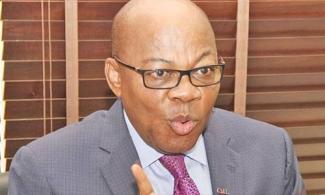
Agbakoba disclosed this while speaking on Arise TV on Wednesday.
Olisa Agbakoba (SAN), former president of the Nigerian Bar Association (NBA), has advised the Nigerian judiciary, in particular the arm responsible for deciding on presidential election petition matters, to decide and make a judgement on such matters within seven days of receiving the petition.
Agbakoba disclosed this while speaking on Arise TV on Wednesday.
He added that a candidate must score 25 per cent in Abuja to be declared the winner of a presidential election.
“As far as I am concerned, you must also win 25% in FCT, but it's not for me to say. The tribunal can answer this question quite easily in 1hr. It's not a difficult question,” the lawyer stated.
This is coming as Nigerians are struggling to interpret Section 133 (1) (b) of the Nigerian Constitution, which said a candidate can only be declared president if “he has not less than one-quarter of the votes cast at the election in each of at least two-thirds of all the States in the Federation and the Federal Capital Territory, Abuja.”
But the lawyer insisted that the Constitution separated FCT entirely in the instance under discussion.
He further argued that with what was going on, the political atmosphere in the country had become unnecessarily charged.
The lawyer said that if only the right thing could be done—which is to resolve the election petition matter—then normalcy would be restored.
He said, “The other day, the minister of information was accusing Mr. Peter Obi of treason… and all kinds of things were going around. There are a lot of things wanting to destabilise Nigeria—the DSS is shouting that there are people all over the place doing things. And the simple problem is just to resolve the election petitions.
“The question is not whether it is doable, but whether it can be done. So I stand by saying that the judicial philosophy of Nigeria is about 100 years old, and Nigeria is not even for speed.”
Agbakoba argued that countries such as Ghana and Kenya had advanced to the point that resolving election petitions was done within 30 days or less.
“How is it possible that Ghana finishes its own election petition in 30 days? Why can’t we do it here? Why must we have 360 days to do an election that is very simple?” he asked.
He said that the solution to this challenge requires that we apply case management.
“If I were the presiding judge of the tribunal, I would give the petitioner two hours to establish the case as to whether 25 percent of the FCT is relevant in the consideration of who is president or not. I will give Mr. Tinubu time to reply, and I will deliver a ruling at 6 p.m. What’s the difficulty—these are purely matters of law, so it is absolutely feasible,” he explained.
“However, if those three questions don’t succeed, then part A of the petition we will now have to do what you said—take up the issue of electoral malpractice, which I concede will be a lot longer.
“But I have a strong feeling that the three questions I asked can resolve the issue one way or another. It can be resolved in seven days; if Kenya can do it in 14 days, why do we need 360 days to do our own? Are we not more highly educated than Kenya?
“Two, the tribunal itself can raise questions if we set out the petitions that have been taken and resolve the entire thing. I’m concerned that the politics are overheated, and the way to go is to see if we can get the petitions resolved before May 29,” he said.
He questioned the competence of the system that says the issue raised in the tribunal can’t be resolved before handing over.